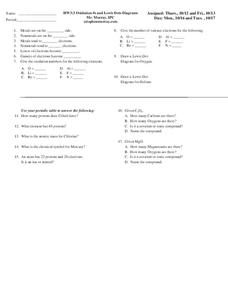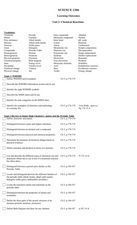Curated OER
Electronegativity
High schoolers identify the type of bonding between two atoms of elements given their electronegativity values. They study the trend of electronegativity across the periodic table in small groups.
Curated OER
Isotopes of Pennies
Students demonstrate that isotopes of an element have different masses. They illustrate atomic mass and neutrons. The periodic table is examined in length. Display of a collection of atoms is surveyed.
Virginia Department of Education
Radioactive Decay and Half-Life
Explain the importance of radioactive half-life as your high school biologists demonstrate the concept by performing a series of steps designed to simulate radioactive decay. Pupils use pennies to perform an experiment and gather data....
Curated OER
Classification is Sweet
Students classify, weight and organize items during this lesson. This lesson works great as or with an introduction of the Periodic Table of Elements.
Curated OER
Metals, Non-metals, Metalloids
Students discuss the physical and chemical properties of metals and non-metals. As a group, they classify items as a metal or non-metal. Using the periodic table chart, students discuss the characteristics of each metal. Based upon...
Cornell University
Bacteria Take Over and Down
Bacteria outnumber all other forms of life on Earth. Scholars observe the growth of bacteria in petri dishes to understand their role in maintaining good health. Then, they observe the growth of bacteria after they introduce...
Curated OER
Atomic Theory
An extremely thorough presentation walks new chemists through the basics of matter. There really isn't a unifying theme, however So many topics are covered: forces, elements, atomic structure, chemical properties, compounds, quarks,...
Curated OER
Ranking Molecular Properties Based Upon Intermolecular Forces
A splendid chart of information about chemical bonding tops the first page. In it you will find information on London forces, permanent dipoles, hydrogen bonds, ionic bonds, and covalent bonds. A four-step process for assigning...
Polar Trec
What Is My Footprint?
How do one's habits and lifestyle choices affect the environment? Through a short online survey, learners will calculate their own carbon footprints then determine how to reduce their impact on the environment through simple steps, such...
NOAA
Ocean Acidification
If tap water is more acidic than ocean water, why are we so concerned about ocean acidification? The third installment of a 23-part NOAA Enrichment in Marine sciences and Oceanography (NEMO) program focuses on carbon dioxide levels in...
Agency for Toxic Substances and Disease Registry
Don't Mess with Mercury (Lesson B)
At one point, people thought mercury was therapeutic for humans, but now we know it is highly toxic. The second of three activities covering mercury focuses on its health hazards if humans are exposed. Pairs research and answer questions...
Creative Chemistry
Maths for AS Chemistry
No practice problems are given on this handout; it is a detailed list of concepts to know and tips for working related problems in chemistry. Give this to learners as a study guide, or use it early in your career as a chemistry...
Perkins School for the Blind
Polyatomic Ion Bingo
If your class is learning about polyatomic ions and needs a fun way to study those chemicals, then a bingo game might be right up your alley. This bingo game is intended to boost memorization skills, specifically the names of tricky...
Curated OER
Gases and Plasmas
Students determine what plasma is and why the sun is made up of plasma. They recognize situations where plasmas are found in nature and made by man. They discuss why the sun is a huge ball of plasma and if there are different levels of...
Curated OER
All About Circuits ~ Atomic Structure
In this interactive Internet assignment, physical science investigators answer 11 questions about the atom, the subatomic particles, and atomic structure. They can click on "Reveal Answer" to discover if they are correct. They also...
Alabama Learning Exchange
Float or Sink?
Experiment with mass and density as scholars figure out what makes things float or sink. First, they watch a podcast introducing these concepts. Be sure to use the comprehension question to test their understanding. Young scientists...
Curated OER
Why Do Atoms Combine?
In this atom learning exercise, students will complete 8 fill in the blank statements based on the different parts of an atom. Then students will explain how the arrangement of electrons in an atom is related to the periodic table.
Curated OER
Crystals: What Are They and What Holds Them Together
Young scholars are introduced to the characteristics of crystals and what keeps them together. Using the Periodic Table, they examine the various elements and develop a model of an atom. In groups, they place sugar and salt in petri...
Curated OER
Making Atoms
In this atoms worksheet, students determine an atoms based on its protons, and neutrons. Students determine the electron levels for the oxygen atom. This worksheet has 1 multiple choice, 4 fill in the blank, and 13 short answer questions.
Curated OER
Oxidation Numbers
In this oxidation numbers worksheet, learners determine the oxidation number for given elements and draw Lewis Dot Diagrams. This worksheet has 6 fill in the blank and 11 short answer questions.
Curated OER
Learning Outcomes
In this science worksheet, learners explore the learning outcomes for a unit on chemical reactions. Students define 60 vocabulary words and answer a list of questions for each topic.
Curated OER
Ionic bonding
Students explore ionic bonding. They draw examples of ionic bonding and explain the activities of the electrons of the elements. Students use paper plates and candy to draw electron configurations of given atoms.
Curated OER
Atoms and Chemical Bonding
An online resource, this worksheet has your chemistry learners complete four data tables with information about atoms and chemical bonds. The first table addresses atomic number and mass, as well as numbers of protons, neutrons, and...
Curated OER
The Biogeochemical Cycles
The majority of this presentation is a collection of diagrams and graphs that back your lecture on biogeochemical cycles. The last few slides define ecosystems and the Gaia hypothesis. You may find these slides valuable, but will...

























